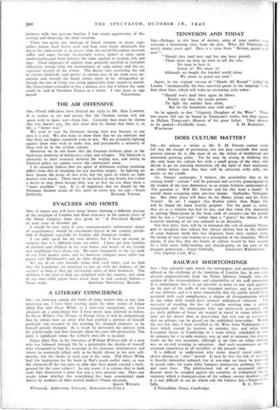RAILWAY SHORTCOMINGS
Sin,—The splendid reply which the newspapers and periodicals hate offered to the challenge of the bombing of London has, in one case. elicited congratulations from the Prime Minister himself, who has spoken of the resourcefulness and adaptability of the staff concerned. It is unfortunate that it is not possible to point to any such 'pantie, on the part of the staffs of our transport services, and in particular of our railways, and it is most remarkable that the public should have accepted with such complacency a degree of disorganisation which in any other field would have aroused widespread criticism. The necessity of avoiding the loss of valuable working time is widely recognised, and the consequent risks are universally accepted, and yet daily millions of hours are wasted in travel in trains which not only are far slower than in peace-time, but also run so irregularly that no reliance can be placed on the published time-tables. Within the last few days I have travelled to the West from Paddington in a train which started its journey zo minutes late, and twice from Liverpool Street to Cambridge in a train which, scheduled to take 91 minutes for a 55-mile journey, was 45 and so minutes late respec- tively on the two occasions, although at no time on either journey was an air-raid warning in operation. And such occurrences are the common experience of all travellers at the present time. It is difficult to understand why trains should travel especially slowly during an " alert " period. It may be that the risk of accident is thereby somewhat reduced, but in war-time we must be prePav'd to accept risks, for every delay hampers production, prolongs the w3r and costs lives. The infinitesimal risk of an occasional railway disaster must be weighed against the certainty of widespread incon- venience which a disorganisation of the railway service involves it is not difficult to see on which side the balance lies.—Yours f.
fully, It C. Eva• 8 Fitzwilliam Street, Cambridge.






























 Previous page
Previous page